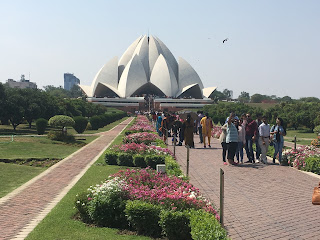In March 2017, co-chairing the Open Government Track in United Nations's majestic ICEGOV 2017 conference in Delhi, proved to be the core of an inspiring week.
The conference was attended by more than 1,500 participants, with the two-thirds being Indian - surely, the widest local participation in the 10 years of ICEGOV. Which was coupled by a mostly impressive organisation and coverage.
The conference was attended by the Indian Minister of Telecommunications, the Minister of Education and several State Ministers (these belong to the numerous local governments, typically implementing the country and region strategy with the collaboration of a few to a hundred million people), to couple with UN officials, policy experts and technology gurus that passed from the podiums. More than 100 papers were presented in the three days of the conference, while numerous projects and organisations from the region had a booth at the exhibition. In every lunch or coffee break you could freely eat, have coffee or talk under the huge tent, with one or more of 1,000 people.
Our track on Open goverment, co-chaired with Rony Medaglia from Copenhagen Business School, delivered a few well-selected contributions on open data, service co-design and big-data from policy making. You may see all the track via the YouTube video
 |
| With co-chairs and authors in Open Government Track |
Digital India
During the opening ceremony of ICEGOV 2017, one could not miss the 100 seats reserved for the "Digital Champions of India". Initially empty, they were almost packed when digital champions arrived in groups, after travelling one to one thousand miles, to come from home.
... not by the number but by the average age: less than 20 years old, or at least that was my feeling.
 |
| With Digital India Champions |
I kept going with the conference, the presentations, the informal discussions with friends and colleagues from several countries. Then, at lunch time, I was approached by a group of young students, to plan for a short interview with the "Digital India Channel", a project broadcasting all Digital India activities through internet, TV and other media, thus having a studio within the conference.
I was impressed for a second time
... enough to think "now I have a reason to learn more about Digital India"
So, I immediately came in contact with the organisers who prompted me to the proper guy: the KMPG consultant, leading a team that was running some parts of Digital India dissemination. My demand was simple, I thought, to find 2-3 young digital champions to have a short interview with, so I could write the lines you read now. In a couple of hours, we had a place, three rande-vous set and almost 10 other people fidgeting around, gathering even more of their colleagues from time to time.
-- The first champion: The literature student
The first was a 21-years young man, studying Sanskrit Literature and Linguistics, who knew how to handle computers, mobiles, internet browsers and the sort. So, he applied to the Digital India - Village Level Entrepreneurship (VLE) programme, under the Education scheme. After becoming an educator, he managed to educate not less than 600 people in 9 months, in the use of internet technologies, making them capable to handle typical G2C and B2C transactions, and get certified at country - wide exams. His overall income for nine months (8/2016 - 3/2017) exceeded 300,000 Indian Rupees (when a basic salary in his region is not more than 20,000 per month).
This case was larger and more complex: a team of four women, skilled on ICT tasks and systems, created an SME, to provide educational services, in a 50% partnership with the state. The state giving also 50% of the capital and immediate revenue through the training of individuals and VSE's - SME's in the region. The training programme ended successfully and now the company provides support services to enterprises related to the use, further exploitation or customisation of government services. The company is profitable, still retaining the profits, with the consent if its stakeholders- both the state and the four founders.
With Digital Champions at the press center
The realisation of the immense power of education in this digital programme became more clear at the closing of the conference, where we concluded with the presence of Minister of Education.
- "Why is the Minister of Education here, in Digital India", he asked.
- "Only to declare that we are ready to contribute", he said and paused.
- "With an "army" of 100 million students.", he added, congratulating the numerous students in the room.
And, I was impressed for a third time.
I went on thinking upon the Greek National Digital Policy, the European Commission funded programmes and relevant topics of the "west" ...
Have a look at Digital India programme here.
Have a look at Digital India programme here.
India
My overall impressions from India, especially (new) Delhi, are currently under organisation and writing. For the moment, I can just share a few of the material, in picture format.





















